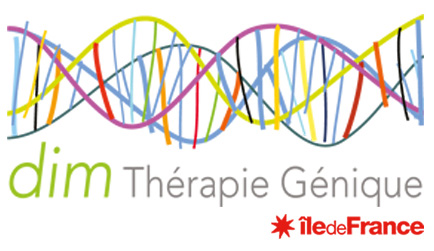Since 2020, the Paris Region has been rewarding researchers and their teams for their work in the field of health with the Innovators Award. This year again, one of the DIM Gene Therapy network researchers, Dr. Annarita Miccio, Research Director at the Institut Imagine, stood out for the scientific excellence of her research work.
The Paris Region Innovators Award aims to encourage, support and promote research, technology transfer and the emergence of health innovations. Each year, the Award honors 3 Paris Region researchers under the age of 45 for the exceptional quality of their work and their impact. Among the 3 researchers awarded this year, Dr. Annarita Miccio, Research Director of the “Chromatin and gene regulation during development” lab at Institut Imagine, and DIM Gene Therapy network member, received the first prize for her work on the regulation of the globin gene. This gene codes for a protein, the adult hemoglobin, essential for the oxygen transport in the blood and for the proper functioning of cells. In patients with beta-hemoglobinopathies, common genetic diseases caused by mutations affecting adult hemoglobin (e.g. beta-thalassemia, sickle cell disease), low hemoglobin levels in red blood cells do not allow sufficient oxygen supply in the body, leading to clinical signs such as anemia or even organ damage, depending on the severity of the disease. So far, the only curative treatment available for patients is a bone marrow transplant from compatible donors that is unfortunately available only to a fraction of patients. For others, a frequent blood transfusion corrects the symptoms and limits complications.
At the Institut Imagine, Dr. Annarita Miccio and her team, have developed a new therapeutic strategy against beta-hemoglobinopathies. By using CRISPR/Cas9 genome editing tools that can modify DNA, researchers can correct the mutations that cause these genetic diseases. In the case of Dr. Miccio’s research, the strategy is to reactivate the expression of the fetal hemoglobin gene (expressed during fetal life then generally turns off after birth), to compensate for the lack of hemoglobin adult in the patients red blood cells. By increasing the level of therapeutic fetal hemoglobin, the clinical signs of patients could be improved. This innovative work also benefits from the support of the DIM Gene Therapy.
A researcher from the DIM Gene Therapy network once again awarded
After Dr. Deniz Dalkara, Research Director at the Institut de la Vision, rewarded for her research in the field of emerging therapies on visual restoration, this is the second time that a DIM Gene Therapy network member has been winner of this award. This is not surprising since the DIM Gene Therapy brings together and structures into a network of excellence, the best scientific actors in the Paris Region in the field of gene therapy, a most innovative and promising therapeutic strategy in personalized medicine. The DIM support and its leverage effect has contributed also to these advances, to eventually, generate innovation in the development of treatments for serious or chronic illnesses without treatment till today, or for which the medical care is still largely not satisfying.
To read: Innovators Award 2021: Deniz Dalkara laureate for her results on visual restoration by gene therapy
Support research in the field of health
With a total budget of 100,000 euros, the Paris Region wishes to help researchers their work, but also to promote their work and their involvement in scientific excellence and the influence of the Paris Region territory. For Dr. Miccio’s team, this prize will allow to finance part of preclinical studies, but also a freedom to operate study, aimed at creating a startup or an operating license with an industrial company, which will provide the financial, regulatory and logistical means to treat on a large scale, patients suffering from beta-hemoglobinopathies.
Aurélie Laubier, PhD, Project manager DIM Thérapie Génique
Sources
Prix des Innovateurs Île-de-France : les lauréats 2023
Annarita Miccio lab “Chromatin and gene regulation during development”, Institut Imagine


